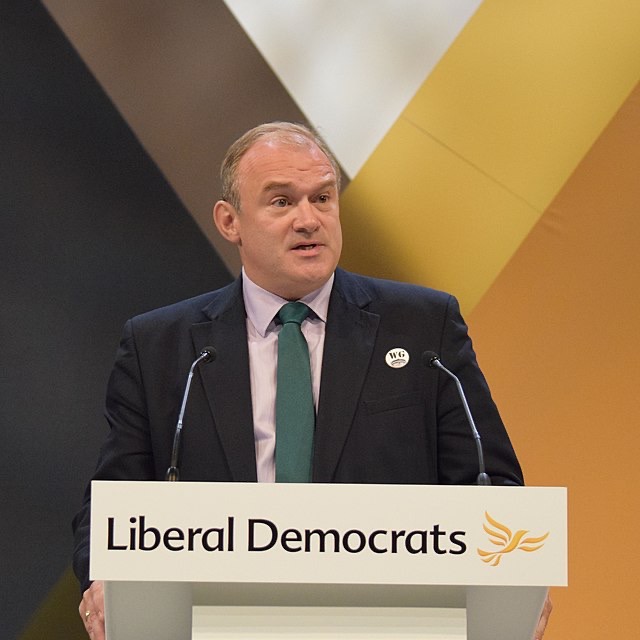Liberal Democrat leader Ed Davey slams Conservative Kemi Badenoch’s claim that net zero is ‘impossible’. Discover why this row is shaking up UK climate policy and 2025 politics.
Introduction
The UK’s climate ambitions have been thrown into the political spotlight after a fiery exchange between Liberal Democrat leader Ed Davey and Conservative heavyweight Kemi Badenoch. Badenoch, a top Tory leadership contender, recently dismissed the government’s net zero by 2050 target as “impossible”—a statement that triggered a storm of criticism.
Ed Davey didn’t hold back. Accusing Badenoch of “echoing Donald Trump,” he warned that her rhetoric threatens both the environment and the UK’s credibility on the global stage.
This isn’t just another party squabble. It’s a full-blown ideological showdown with major implications for the UK’s climate future.
Kemi Badenoch’s Net Zero Controversy
Speaking at a recent conference, Kemi Badenoch described the UK’s legally binding net zero target as a “fantasy” that could bankrupt the nation. She argued that pushing for carbon neutrality by 2050 would lead to economic hardship and increased dependence on foreign nations—especially China—for green technology like solar panels and wind turbines.
Her quote hit hard:
“Net zero makes us dangerously dependent on countries that don’t share our values…”
She went further, suggesting that some climate goals were more about political image than realistic policy, questioning whether the UK’s current trajectory is sustainable.
Ed Davey’s Blistering Response
In a sharply worded rebuttal, Ed Davey lambasted Badenoch’s comments. He drew a direct comparison to Donald Trump’s climate denialism and accused Badenoch of jeopardizing not just the UK’s environmental integrity, but also its economic potential.
Davey stated:
“Abandoning net zero would line the pockets of people like Vladimir Putin, deepen our fossil fuel addiction, and destroy our global leadership on climate.”
The Liberal Democrat leader emphasized that the UK must not backslide on climate goals, especially with industries, investors, and global partners watching closely.
What Is the UK’s Net Zero by 2050 Target?
The UK’s net zero policy aims to balance the amount of greenhouse gases emitted with the amount removed from the atmosphere, reaching carbon neutrality by 2050. It was enshrined into law in 2019 and is seen as a cornerstone of global climate leadership.
Reaching this goal involves major transitions in energy, transport, agriculture, and housing—including phasing out petrol vehicles, scaling up renewables, and retrofitting homes for efficiency.
Why the Disagreement Matters
The net zero debate strikes at the heart of two competing visions for Britain’s future:
- One side, led by figures like Davey and Chris Skidmore, sees climate leadership as a route to prosperity, innovation, and energy independence.
- The other, represented by Badenoch, argues that the path to net zero is unrealistic and economically reckless.
This disagreement isn’t just about science—it’s about sovereignty, identity, and economic direction.
Backlash from Across the Political Spectrum
Badenoch’s remarks didn’t just provoke Ed Davey. Even within her own party, criticism followed swiftly.
Former Conservative minister Chris Skidmore, who spearheaded the UK’s net zero legislation, called her comments “bizarre” and “disingenuous.” He highlighted her past support for green policies, pointing out the inconsistency in her current position.
Meanwhile, the Confederation of British Industry (CBI) voiced concern. They warned that backing away from net zero would scare off green investors and undermine thousands of jobs in the renewable energy sector.
“Now is not the time to step back from the green economy,” said CBI chief Rain Newton-Smith.
The Economic Argument: Green Growth vs. Dependency
Badenoch argues that chasing net zero could increase dependency on geopolitical rivals. Her concern: the UK imports most of its green tech from countries like China. In her view, this poses a strategic risk.
But climate advocates argue the opposite: investing in clean energy now means building a domestic green economy, reducing reliance on volatile global energy markets.
Clean jobs. Export opportunities. Energy independence. That’s the case Ed Davey and his allies are making.
Public Support for Climate Action
Poll after poll shows that a clear majority of UK voters support climate action—including strong backing for net zero goals. Support spans across demographics, including age, class, and even political affiliation.
Backing away from these commitments could risk alienating younger voters and urban professionals—key swing demographics in upcoming elections.
Impact on the 2024/2025 Political Landscape
Climate change is no longer a side issue—it’s central to the next general election. This debate between Davey and Badenoch offers a preview of a larger battle:
- Tories divided between pragmatic realists and climate skeptics.
- Liberal Democrats and Labour pushing forward with green growth strategies.
Voters will be forced to choose: double down on the net zero journey, or hit the brakes?
Conclusion
Kemi Badenoch’s dismissal of the UK’s net zero goals has triggered a political firestorm. With Ed Davey’s fierce rebuttal, the lines are drawn in a national debate about Britain’s future. Is net zero an unachievable fantasy—or an economic and moral imperative?
As climate becomes an election-defining issue, the stakes couldn’t be higher. The outcome will shape not only the planet’s future, but also the UK’s place in the world.
FAQs
1. What did Kemi Badenoch say about net zero?
She called the UK’s 2050 net zero target “impossible” and warned it could bankrupt the country or hurt national security by increasing dependence on China.
2. Why did Ed Davey criticize Badenoch?
He accused her of echoing Donald Trump’s climate denialism and warned that abandoning net zero would harm both the planet and the economy.
3. What is the UK’s net zero target?
It’s a legally binding commitment to reduce greenhouse gas emissions to net zero by 2050, meaning emissions will be balanced by removals.
4. Do people in the UK support net zero?
Yes. Surveys show strong public support for environmental action and climate policies across all major voter groups.
5. What’s at stake politically?
Climate policy is emerging as a defining issue for the next election, influencing how parties position themselves and how voters choose their leaders.



